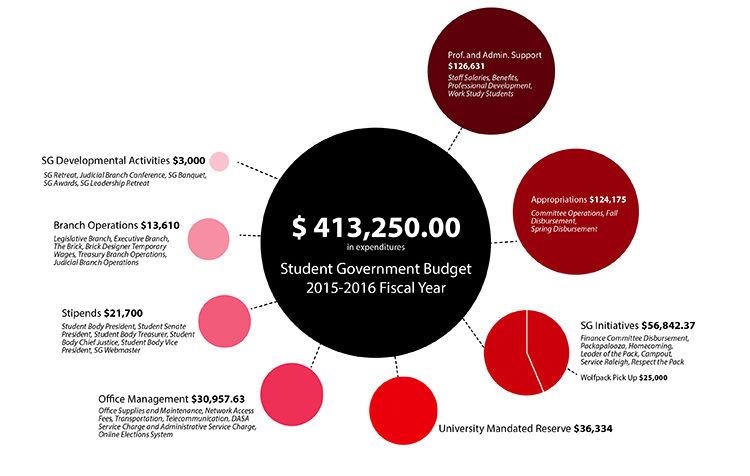When the Student Senate passed a $413,250 Student Government budget for the 2015-2016 school year, one item in particular provoked significant debate.
With a $25,000 grant from the Alumni Association, Wolfpack Pick Up is the most funded initiative in the budget, and the student fee increase adds an additional $13,750 to its budget.
The approved budget, which includes funds from a $0.65 fee increase for the next two years, allots $0.15 of each student’s additional fee to increase executive branch programing and $0.50 to fund Wolfpack Pick Up, NC State’s ride program for disabled students and students with mobility impairments.
In addition to being the most expensive initiative in Student Government, Wolfpack Pick Up was also the most contentious. Many proposed amendments to the budget would have drastically reduced funding to Wolfpack Pick Up, with some proposing to cut funding completely.
“Wolfpack Pick Up is the first good thing Student Government did in my time at NC State,” said Student Body President Rusty Mau. “If you want to fund half a program, you’re just like the Republicans trying to defund Obamacare.”
Wolfpack Pick Up began in 2014 as a ride system for students with mobility impairments. Unlike most other initiatives included in the budget, Student Government will now be the sole funder of the service.
“Ultimately, with this initiative and with this funding, we are addressing the concern of accessibility on this campus,” said Mitchell Moravec, the Student Senate Secretary. “This is a concern that I have dealt with and many students have dealt with. It’s a problem that we should tackle.”
Last year, the service’s first year in operation, Wolfpack Pick Up operated under a memorandum of understanding with other organizations on campus.
The Division of Academic and Student Affairs covered all expenses directly related to cart maintenance and service as well as insurance fees, Student Involvement provided $2,000, Student Leadership and Engagement funded $10,000, and mandated reserves provided funds for all additional expenses, according to Mau.
Much of the debate about the service centered on the fluctuation in rides the service provided from week to week. Wolfpack Pick Up peaked at more than 100 rides in one week, but other weeks saw no more than two riders.
The lack of predictability makes planning the service difficult, especially when riders do not sign up for rides but instead catch rides when drivers happen to pass by, according to Student Body Vice President Devan Riley.
Currently, the drivers are instructed to seek people in need of rides, but senators discussed limiting rides to only scheduled appointments before the final budget was passed.
“If this amendment were to pass, we would be crippling the service that started,” Mau said.
One method the senators considered to reduce the cost included lowering the wages of the golf cart drivers from $10 to $8 an hour, which would have saved about $5,000.
Mau said it was difficult to justify reducing spending on Wolfpack Pick Up because Student Government will be in a position next year to reach more students with the service and will be better able to find alternative sources of funding for it.
It is also possible the service will help generate additional revenue for Student Government if it is able to rent the service out for different events on campus, according to Mau.
Arianna Nasser, a senator from the College of Engineering and a senior studying biomedical engineering, said if there was another option to bring it to another department, Student Government would have taken it.
“It’s an incredible initiative out of Student Government,” Nasser said. “It was started by students, it’s currently being funded by students, and it’s something that I think we should see through and see grow.”
Diya Sashidhar, a senior studying applied mathematics, had to use Wolfpack Pick Up for three months after she tore her ACL and couldn’t get from her dorm to Tompkins Hall.
“This service is extremely useful, and I’m saying that from experience,” Sashidhar said.
Karli Moore, a student body treasurer and a senior studying chemistry, said it is Student Government’s job to find voids in available student services and fill them.
“If you want to pinch pennies, go somewhere else,” Moore said.
The budget will fund $21,700 in stipends for the Executive Cabinet; $124,175 in appropriations, funding for clubs on campus; and $56,842 for several initiatives including Wolfpack Pick Up, Packapalooza, Homecoming, Campout, Leader of the Pack, Respect the Pack and Service Raleigh; $30,957 for Office Management; and $126,631 for professional and administrative support. Student Government is funded by a $14.50 fee.








